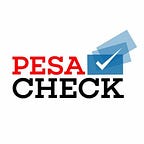HOAX: This page offering Ksh20,000 COVID-19 relief cash from Governor Mike Sonko is fake
The page claims that the cash transfer would be from the Central Bank of Kenya, but it is not owned or managed by Governor Sonko or his team
A Facebook page bearing the name and image of Nairobi Governor Mike Sonko and offering cash relief to Kenyans in distress as a result of COVID-19 is FAKE.
The ‘Mike Sonko Rescue Team’ page, which claims the Nairobi governor is offering Ksh20,000 relief, also has a follow-up post, informing users that the donations are still ongoing.
Users are asked to send their M-Pesa numbers via the page’s Facebook Messenger, so as to receive the cash directly in their mobile money wallets.
However, the governor’s communication director, Elkana Jacob, dismissed the claim that Mr Sonko runs the page and is donating COVID-19 cash relief to Kenyans.
“The page, like many others that we have reported, is being used by scammers who are using the name of the governor to rob Kenyans,” Mr Jacob said.
He added that Governor Sonko only uses his official verified Facebook page, ‘Mike Sonko’, for official communication. The Nairobi governor also runs a philanthropic organization known as the Sonko Rescue Team, whose events are posts on his verified page.
Another post on the page claims that the notification of a cash transfer would come from the Central Bank.
However, Facebook Page Transparency shows the imposter page was created on May 18, 2020, while the legitimate ‘Mike Sonko’ page was created on September 21, 2010.
PesaCheck has looked into a Facebook page claiming that Nairobi Governor Mike Sonko is offering Ksh 20,000 as COVID-19 relief funds and finds it to be FALSE.
This post is part of an ongoing series of PesaCheck fact-checks examining content marked as potential misinformation on Facebook and other social media platforms.
By partnering with Facebook and similar social media platforms, third-party fact-checking organisations like PesaCheck are helping to sort fact from fiction. We do this by giving the public deeper insight and context to posts they see in their social media feeds.
Have you spotted what you think is fake news or false information on Facebook? Here’s how you can report. And, here’s more information on PesaCheck’s methodology for fact-checking questionable content.
This fact-check was written by PesaCheck Fact-Checker James Okong’o and edited by PesaCheck Deputy Editor Enock Nyariki.
The article was approved for publication by PesaCheck Managing Editor Eric Mugendi.
PesaCheck is East Africa’s first public finance fact-checking initiative. It was co-founded by Catherine Gicheru and Justin Arenstein, and is being incubated by the continent’s largest civic technology and data journalism accelerator: Code for Africa. It seeks to help the public separate fact from fiction in public pronouncements about the numbers that shape our world, with a special emphasis on pronouncements about public finances that shape government’s delivery of Sustainable Development Goals (SDG) public services, such as healthcare, rural development and access to water/sanitation. PesaCheck also tests the accuracy of media reportage. To find out more about the project, visit pesacheck.org.
PesaCheck is an initiative of Code for Africa, through its innovateAFRICA fund, with support from Deutsche Welle Akademie, in partnership with a coalition of local African media and other civic watchdog organisations.
